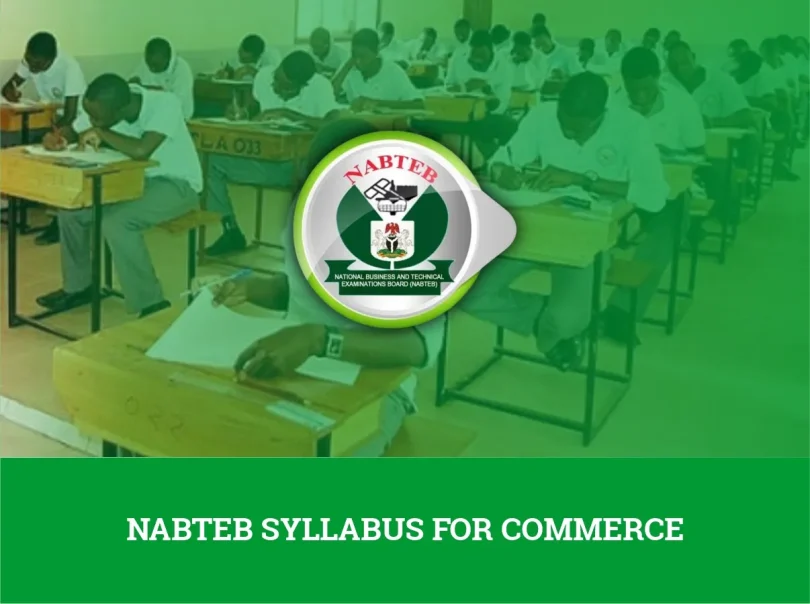The National Business and Technical Examinations Board (NABTEB) has officially released the syllabus for all subjects for the 2026 examination. If you have registered to write NABTEB this year, it’s important that you check the syllabus for each subject you are offering.
Studying with the syllabus makes your preparation more focused, easier, and more rewarding. Why? Because all the questions you will see in the exam will be drawn directly from the topics listed in the syllabus.
Below is the NABTEB Syllabus for Commerce. You can scroll down to view it directly, download it for later, or simply save this page on your device and come back to it while reading.
NABTEB Syllabus For Commerce
Make sure you go through all the topics listed in the NABTEB Syllabus for Commerce, because this is exactly where the exam questions will come from. Don’t skip any, your success starts with understanding what to expect.
| Topic/Objectives | Contents |
|---|---|
| 1.0 Introduction to Commerce | 1. Meaning of Commerce. 2. Functions. 3. Divisions and subdivisions. 4. History of Commerce in Nigeria. |
| 2(a) Good and Services | 1. Goods and services provided by commercial organizations. 2. The difference between consumable and durable goods. 3. Goods and services provided by the public sector, e.g. postal services, water supply, electricity, etc. |
| 2(b) Documents used and terms connected with the buying and selling of goods and services | 1. Essential documents: letters of inquiry, invoice, credit and debit notes, etc. 2. Trade terms and abbreviations: Trade discount each discount, quantity discount, F.O.B., E O.E. etc. 3. Terms of payment: Cash, hire and deferred payments. 4. Means of payment: Legal tender, cheques, standing order, bank drafts, stamps, postal orders, money order, bill of exchange, promissory notes etc. |
| 3.0 Organization of production | 1. Definition of production. 2. Factors of production. 3. Advantages and disadvantages of specialization. 4. Inter-relationship between production and exchange. 5. Specialization/division of labour. 6. Forms of production |
| 4.0 Occupation | 1. Meaning of occupation 2. Determining factors 3. Types of occupations |
| 5.0 Trade | 1. Definition of trade 2. Types of trade (a) Home Trade (b) International Trade 3. Channels of distribution – wholesalers and retailers. 4. Procedures and documents used in purchasing and selling in home trade, e.g. requisition form, invoice, credit note, debit note, delivery note etc. 5. Procedure and documentation in foreign trade e.g. indent, shipping note, freight note, consular invoice etc. 6. Methods of payment, stock control and terms of sale. 7. Definitions and explanations of: (a) Terms of trade. (b) Balance of Trade. (c) Balance of Payment. (a) Visible and Invisible Trade. (b) Tariffs/customs duties and excise duties. (c) Free Trade Area. |
| 6.0 Business Organisation | 1. Forms of Business Organisations (Public and Private) e.g. sole proprietorship, partnership, private limited liability company, public limited liability company. 2. Formation of partnership. 3. Formation of cooperative societies. 4. Formation of companies and Registration under 1968 Company Act. 5. The functions of the Business Associations. Chamber of Commerce, Trade Association, Trade Union etc. |
| 7.0 Money | 1. Definition of money. 2. Evolution of money. 3. Forms of money. 4. Functions. 5. Qualities. |
| 8.0 Banking and Finance | 1. Meaning and types of banks. 2. Functions of central Bank, Commercial Community Merchant, Savings and Development banks. 3. The Commercial Banking Services: Current account, savings account, fixed deposit account. 4. Meaning, functions/importance, organizational set-up, transaction procedures and speculators at the stock exchange. The second-tier securities market. |
| 9.0 Credit | 1. Meaning and functions of credit. 2. Advantages and disadvantages of credit. 3. Sources of credit. 4. Credit instruments. |
| 10.0 Transport | 1. Meaning of transportation. 2. Importance of transportation. 3. Forms of transportation (land, water, air, pipe-line, etc). 4. Factors deciding the mode of transport e.g. nature of goods. 5. Functions of the ports and Airports Authorities. 6. Documents used in transportation. |
| 11.0 Insurance | 1. Definition of insurance 2. Importance of insurance 3. Types of insurance 4. Differences between insurance risks and non-insurance risks. 5. Procedure for effecting insurance contract list examples here. 6. Basic principles of insurance: – Insurance interest – Indemnity – Utmost Good Faith – Subrogation – Contribution – Proximate cause. 7. History of insurance in Nigeria. |
| 12.0 Communication | 1. Meaning and types of communication 2. Importance of communication. 3. Development of communication in Nigeria. 4. Role of communication agencies – NITEL, NIPOST, COURIER SERVICES etc. |
| 13.0 Advertising | 1. Meaning of advertising. 2. Role of advertising. 3. Types and media of advertising. 4. Advantages and disadvantages of advertising. 5. Consumer protection in advertising. |
| 14.0 Marketing | 1. Meaning of marketing 2. Importance of marketing in an economy 3. Functions of marketing: selling, buying, storing, transporting, financing, risk bearing, securing information etc. 4. Marketing concept of business 5. The four P’s of marketing. 6. Marketing research, product design, packaging etc. |
| 15.0 Nationalization and Indigenization | 1. Meaning: Aims and objectives of nationalization. 2. Advantages and disadvantages of nationalization. 3. Meaning: Aims and objectives of indigenization. 4. Advantages and disadvantages of indigenization. |
As you study, make sure you are using recommended study materials and past questions along with this syllabus. This will help you better understand how questions are asked and increase your chances of success in the exam.
Share this post with other candidates who are also writing Commerce in NABTEB 2026. Need the syllabus for other NABTEB subjects? You can rely on our page for the complete and up-to-date syllabi for all subjects in the 2026 exam.







Leave a Comment